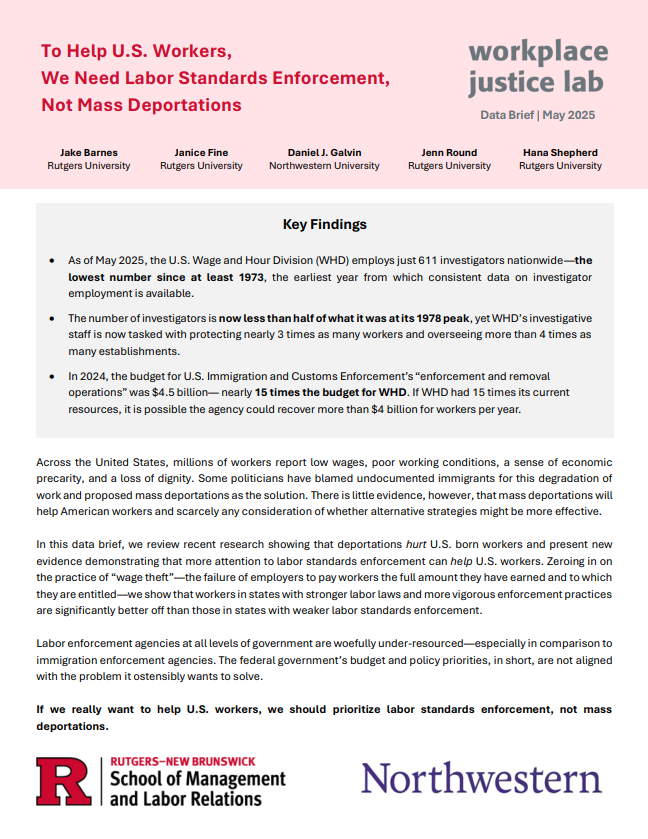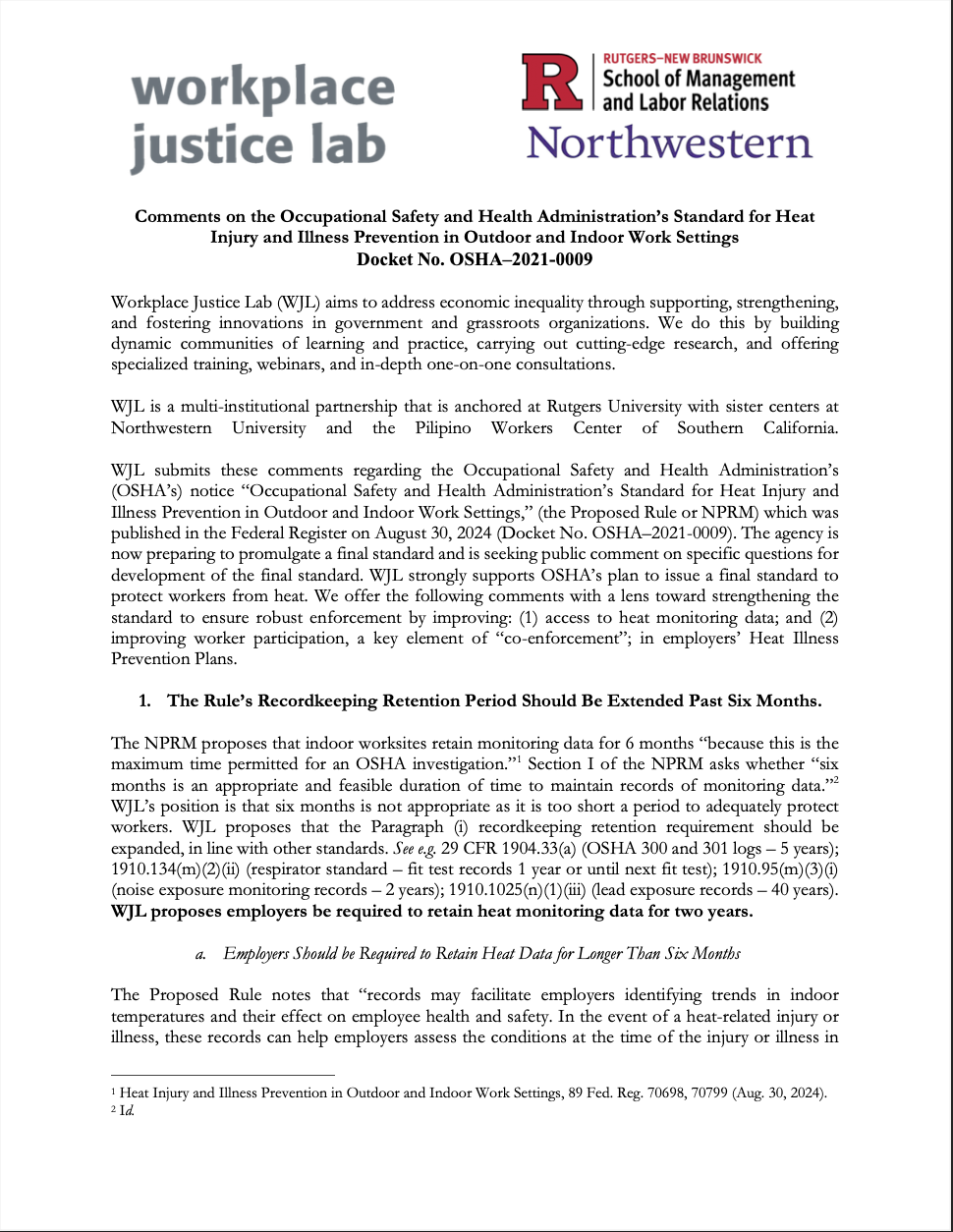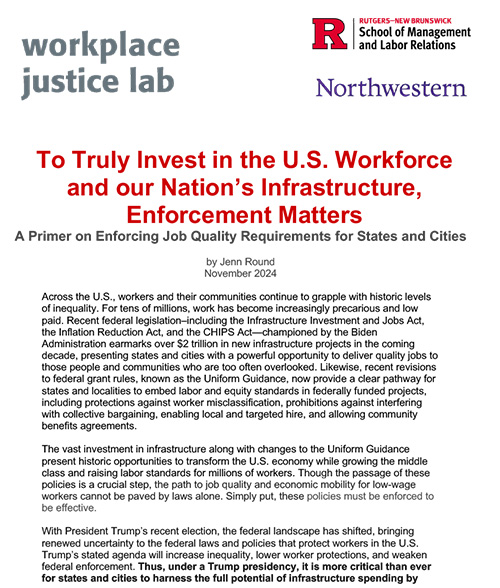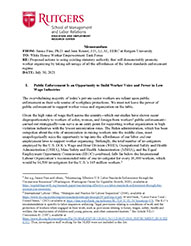
Read the latest Beyond the Bill studies and policy papers
from the Workplace Justice Lab@RU
National/Federal Enforcement
 To Help U.S. Workers, We Need Labor Standards Enforcement, Not Mass Deportations
To Help U.S. Workers, We Need Labor Standards Enforcement, Not Mass Deportations

Memorandum for the White House Worker Empowerment Task Force: Proposed actions to using existing statutory authority that will demonstrably promote worker organizing by taking advantage of all the affordances of the labor standards enforcement regime
Maintaining effective U.S. labor standards enforcement through the coronavirus recession
Webinar Cross References:
State/Regional Enforcement
Analyzing 20 years of federal employment data, this study provides a comprehensive look at minimum wage violations in North Carolina. The study found that each year tens of thousands of workers in North Carolina are illegally paid below $7.25 an hour, but an exemption in the state’s labor law and a shortage of enforcement resources make it difficult for workers to recoup stolen wages.
This study examines minimum wage violations in California between 2014 and 2023. This research is part of a larger project intended to assess opportunities and inform strategies of local labor standards enforcement agencies within California. Our findings include individual, industrial, and job characteristics that are associated with higher levels of wage theft in California.
This study examines minimum wage violations in New Mexico over the past 20 years. Our findings include the industries and occupations in New Mexico with the highest minimum wage violation rates, as well as the demographic groups who are disproportionately likely to suffer such violations.
This study, completed in partnership with the Workers Defense Project, examines minimum wage compliance in Texas and analyzes thousands of Texas Payday Law claims made to the Texas Workforce Commission. Our findings reveal that wage theft in Texas is widespread and disproportionately impacts immigrants, women, and workers of color. Additionally, our analysis shows that the state enforcement agency has failed to recover millions of dollars for aggrieved workers.
In partnership with the State Innovation Exchange (SIX), this two-page issue brief explains how state lawmakers can use anti-retaliation legislation to better protect workers and the rule of law. The paper includes policy options that strengthen retaliation protections, examples of states that have enacted such policies, and additional resources for state legislators to learn more.
 After Florida voters raised the state minimum wage, we contacted key Florida organizers to create a partnership focused on minimum wage enforcement. With the Florida Policy Institute, we authored a study showing that workers of color and immigrants were more likely to experience minimum wage violations, and resulting in the introduction of state bills in February 2021 and January 2022 (HB 507/SB 1756)
After Florida voters raised the state minimum wage, we contacted key Florida organizers to create a partnership focused on minimum wage enforcement. With the Florida Policy Institute, we authored a study showing that workers of color and immigrants were more likely to experience minimum wage violations, and resulting in the introduction of state bills in February 2021 and January 2022 (HB 507/SB 1756)
In early 2020, the New Jersey Department of Labor and Workforce Development (NJDOL) contracted with us to produce three studies, which we completed and released to the agency in February 2021. These studies now inform NJDOL’s strategic enforcement planning efforts. Learn more about the workplace justice lab@RU’s Collaboration with NJDOL.
This study, conducted in partnership with the Oregon Bureau of Labor and Industries, compares minimum wage violation and complaint rates in Oregon. It also examines the relative probabilities that workers from specific demographic groups will experience minimum wage theft.
Municipal/Local Enforcement
This study examines minimum wage violation rates, identifying the workers and industries most affected by minimum wage theft in the Denver area. Using data provided by Denver Labor, the study also assesses how effectively Denver Labor has directed its complaint-based and proactive efforts toward high-impact cases in industries with high violation rates.
This study analyzes the relationship between minimum wage complaints filed with the Minneapolis Labor Standards Enforcement Division and estimates of underlying minimum wage violations. Our findings include the industries in Minneapolis with the highest minimum wage violation rates, as well as the demographic groups who are disproportionately likely to suffer such violations. We are grateful to our local partners in Minneapolis who provided valuable support for this study.
We worked with partners in LA County on a study comparing complaints and compliance with the local minimum wage law. The study was then used as support to establish the Office of Labor Equity (OLE). The motion creating OLE explicitly instructed the new agency to develop strategies and partnerships to target 3 of the 4 industries our study found had the highest violation rates.





